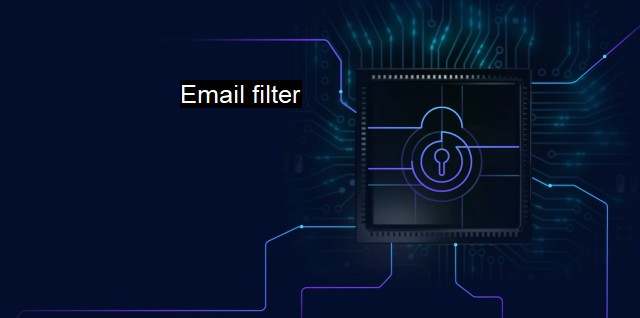What is Email filter?
Email Filters: Bolstering Cybersecurity and Ensuring Confidentiality for Organizations
An email filter, also known as an email filtering service, is an application that categorizes, sorts, blocks, or reroutes email into designated folders according to criteria set by the user or organization. It provides an automated way to manage, sift through, and organize incoming emails based on their content, subject line, sender, or other parameters. The functionality extends beyond personal convenience, becoming an essential part of cybersecurity strategies in both individual and organizational contexts.Cybersecurity involves the protection of internet-connected systems such as hardware, software, and data from cyber threats. Antivirus software is a critical aspect of cybersecurity, programmed to prevent, scan for, detect, and remove software viruses, as well as other hostile actions. Incorporating email filtering as a part of this broad cybersecurity setup can make a significant difference in ensuring the safety and cleanliness of your electronic communication.
Email filtering is strategically implemented to nullify cyber threats, which are often introduced to system software through email. Enclosed within innocent-looking emails, these virtual threats can range from malware or ransomware to spyware, Trojan horses, and phishing schemes. Quite often, these secretive infiltrates destroy important data or result in its exploitation or unauthorized access.
Email filters can be incredibly beneficial, serving several purposes within the realm of antivirus and cybersecurity. The primary reason to use email filters is to thwart spam emails – unsolicited, typically undesired emails, that are sent out in mass quantities. These emails often carry malicious software or hyperlinks, waiting for one naïve click to unleash havoc. More so, spam emails can quite significantly slow down your email service and clog up your inbox, rendering it a tedious task to sort through mails.
Then there are phishing emails, with hackers masquerading behind legitimate looking emails hoping to trick you into revealing sensitive information like passwords, credit card numbers or Social Security numbers. Effective email filtering can play a powerful role in combating this kind of sophisticated and targeted cyber threat.
How does email filtering practically work within the realms of cybersecurity and antivirus measures? Firstly, virus scanners and cybersecurity algorithms inspect all incoming and outgoing email traffic. An email filter works based on certain regulations or rules set up by its user, the software itself, or an IT administrator. These rules might filter emails according to subject matter, sender information, or targeted language.
If an email matches any of these specified regulations, especially by featuring virus-infected files, phishing links, or threatening content spotted by your antivirus program, the email is sent to the user's "spam" or "junk" folder. Certain advanced email filters even possess customizable settings to change what happens to these earmarked mails automatically. They can block them, mark them, move them around, or alert an administrator about a found threat so immediate action can be taken.
Apart from thwarting an immediate threat from suspicious emails, email filtering can facilitate next-level cybersecurity power by early-stage threat detection. Cybersecurity professionals can analyze this data to detect trends or patterns, identifying potential malware or phishing gimmicks before they cause larger damage. Given the sophistication of modern cyber threats and phishing attacks that can bypass some of the basic antivirus and firewall protections, efficient and intelligent email filtering becomes indispensable.
To summarize, the email filter is an effective tool for reducing and eliminating potential threats to individual users and businesses alike. The tech works hand in hand with other cybersecurity applications to provide a multi-pronged approach to securing email networks. In a hyper-connected world laden with cyber threats, email filtering represents an essential control measure for preserving internet health and user security.

Email filter FAQs
What is an email filter?
An email filter is a cybersecurity feature that blocks unwanted or harmful emails from entering your inbox. It uses predefined rules to sort incoming emails based on their content, origin, and other criteria.How does an email filter protect against viruses?
An email filter scans incoming emails for any attachments or links that may contain viruses or malware. If it detects any potentially harmful content, it will quarantine or delete the email before it reaches your inbox, preventing you from unwittingly downloading the virus.What types of emails can an email filter block?
An email filter can block several types of emails, including spam, phishing emails, malware or virus-laden emails, and emails containing suspicious links or attachments. It can also block emails from specific senders or with specific keywords.Do I need to set up an email filter if I already have antivirus software?
Yes, having antivirus software alone is not enough to protect you against email-based threats. Email filters can catch malicious emails that may bypass your antivirus software. It's always recommended to use both antivirus software and email filters for comprehensive protection against cybersecurity threats.| | A | | | B | | | C | | | D | | | E | | | F | | | G | | | H | | | I | | | J | | | K | | | L | | | M | |
| | N | | | O | | | P | | | Q | | | R | | | S | | | T | | | U | | | V | | | W | | | X | | | Y | | | Z | |
| | 1 | | | 2 | | | 3 | | | 4 | | | 7 | | | 8 | | |||||||